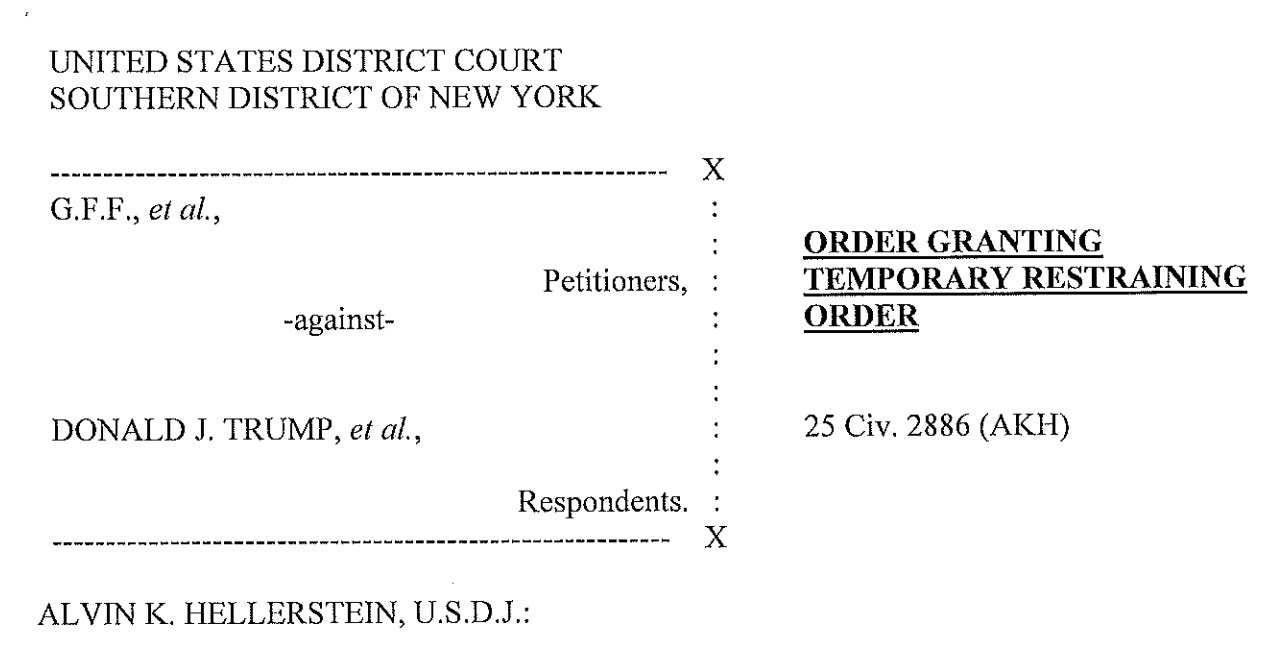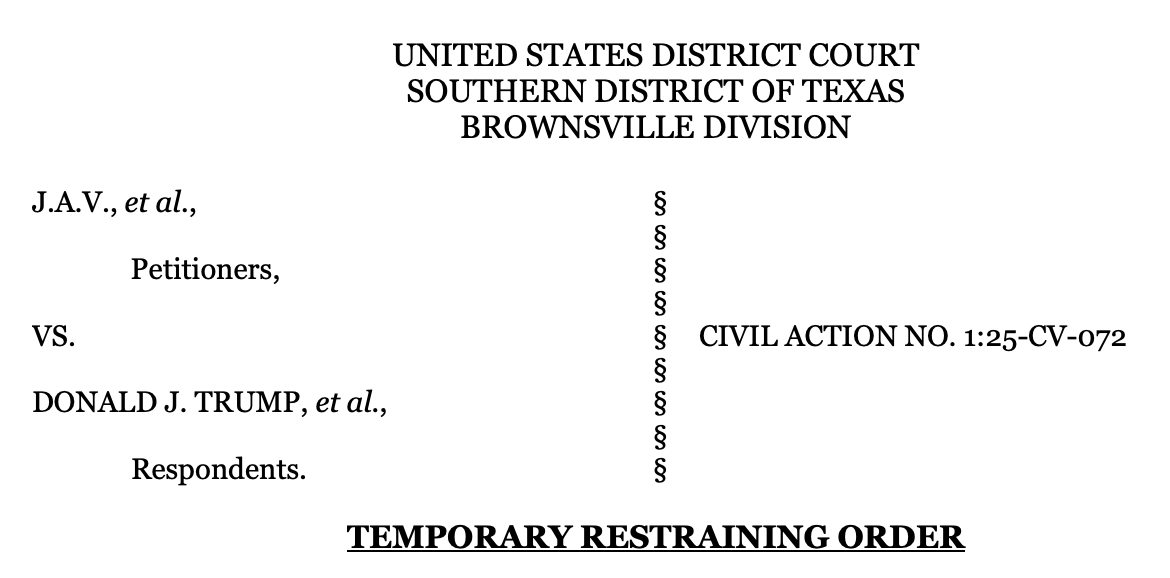Two judges issue temporary orders blocking Trump's Alien Enemies Act removals
UPDATE: The ACLU filed habeas cases in New York and Texas challenging the for deportations after Monday's SCOTUS order required habeas proceedings.
UPDATE: This report was expanded and updated, with the final update at 7:50 p.m. April 9.
In two lawsuits filed in the two days since the U.S. Supreme Court limited Alien Enemies Act litigation to habeas corpus proceedings, federal judges have already issued orders blocking removals under the law that — until last month — had previously only been invoked during wartime.
The ACLU filed a class petition for a writ of habeas corpus in the Southern District of New York on Tuesday challenging President Donald Trump's Alien Enemies Act proclamation and the implementation of it that began on March 15.
The filing was a near-immediate response to Monday's 5-4 U.S. Supreme Court decision holding that challenges to the proclamation and implementation must be brought in habeas.
U.S. District Judge Alvin Hellerstein, a Clinton appointee who has overseen many high-profile cases, on Tuesday quickly scheduled a hearing on a motion for a temporary restraining order for 9 a.m. Wednesday — and ordered the petitioners not to be deported or moved out of the district in the meantime.
That was followed Wednesday morning by a second class petition for a writ of habeas corpus filed in the Southern District of Texas. The ACLU is representing the petitioners in that case as well.
Hours later, U.S. District Judge Fernando Rodriguez, Jr., a Trump appointee, issued a temporary restraining order barring the Trump administration from Alien Enemies Act-based removals "from the El Valle Detention Center" in Texas — where the people taken to the El Salvador prison had been transferred to before the March 15 flights.
The order applies to the three named plaintiffs in that Texas case, as well as “any other person that Respondents claim are subject to removal under the Proclamation“ at the facility. Additionally, the order bars the government from moving anyone covered by the order out of the area — meaning, no transfers to another jurisdiction are permitted.
Following Hellerstein’s hearing, a second TRO — and an order granting a limited class certification — was issued Wednesday evening in the New York-based case. The orders bar the Trump administration from removing anyone in the Southern District of New York from the country under Trump's Alien Enemies Act proclamation or transferring them out of the Southern District of New York.
Of course, and an issue raised by Justice Sonia Sotomayor in her dissent on Monday, these two cases only address two areas — with Rodriguez’s order, as of now, not even covering the whole Southern District of Texas.
And there are 92 other districts in the country.
The Southern District of New York, according to the first petition, is where the two individual petitioners are located, or at least were at the time when the petition was filed.
Although only two individuals are named — with pseudonyms — the ACLU’s intention was for a full class to be protected under the litigation.
“Petitioners seek to represent the following Proposed Class: All noncitizens in immigration custody who were, are, or will be subject to the March 2025 Presidential Proclamation entitled 'Invocation of the Alien Enemies Act Regarding the Invasion of the United States by Tren De Aragua' and/or its implementation,” the petition stated.
However, plaintiffs ultimately limited their request to S.D.N.Y., as Hellerstein noted in his opinion granting class certification:
Further briefing in the New York-based case was ordered on Wednesday, and a preliminary injunction hearing is set for 2:30 p.m. April 22.
In the second case in Texas, the ACLU filed a similar motion for a temporary restraining order on Wednesday morning, as well as a motion to certify the class, which led to similar quick action from Rodriguez.
The court in this case has set a hearing in this case for 1:30 p.m. Friday to “consider whether to extend the temporary restraining order or issue other forms of emergency relief.”
Law Dork will have more on this breaking news story as it develops. Subscribe now.







What about this as a possible route for tRump to take: Evoking habeas corpus and due process is all fine and good, but does not the Writ of Habeas Corpus within the Suspension Clause allows bypassing a habeas process in that: "The federal government may not suspend this privilege except in extraordinary circumstances: when a rebellion or invasion occurs and the public safety requires it."
Recall that tRump cited use of the AEA for disappearing all those Venezuelan immigrants because of "a foreign invasion", and is there the possibility of an enterprising lower federal court tossing out a habeas petition on grounds of "Suspension Clause extraordinary circumstances"?...anything can happen now, given SCOTUS tolerance of tRump's expansion of Executive power.
Strangest class action I've ever heard of. Also, doesn't the notion of a class whose members are not being held in the district where the habeas is filed conflict with the venue requirement discussed in the opinion?